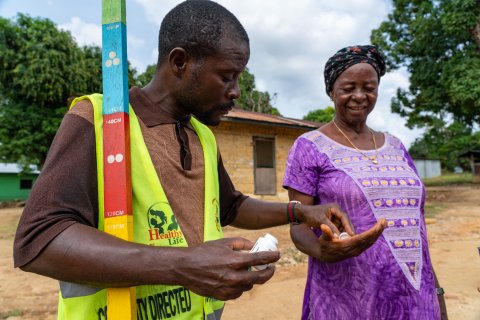RSTMH and Sightsavers announce three-year partnership to highlight research and progress on tackling NTDs

RSTMH is delighted to announce a new three-year partnership with Sightsavers.
This partnership will use RSTMH’s scientific journals and other communications channels to help disseminate the key outputs and learnings of Sightsavers’ lead programmes, in the hope that it will support others to take strides towards eliminating NTDs, strengthening healthcare building blocks and ensuring no one is left behind.
The journals will focus on Sightsavers’ two lead neglected tropical disease (NTD) programmes; the UK aid funded Ascend West and Central Africa programme and the Accelerate programme, and their work in eye health.
NTDs remind us of inequities in health
Tamar Ghosh, RSTMH Chief Executive said: “We are delighted to be working in partnership with Sightsavers to share the outcomes of these incredible programmes. Our journals and other channels will help share important outcomes and learnings with our members and wider networks across sectors and around the world. We are determined to do all we can to eliminate NTDs; diseases which continue to remind us of the inequity in health, and we hope this partnership will help towards this important goal.”
RSTMH’s journals, Transactions and International Health have been publishing authoritative and impactful original, peer-reviewed articles and reviews for over a century.
They offer a respected voice for clinicians, health-related scientists, development organisations and students and deal with a range of topics: Transactions focusing more on parasitology and entomology, microbiology and virology, epidemiology, chemotherapy, immunology, whereas International Health’s remits includes the social and economic aspects of both infectious and non-communicable diseases, health systems research, policy and implementation, and public health.
Lessons from the Field
In 2019, we also launched a new article type in Transactions, “Lessons from the Field”, to help those delivering programmes on the ground showcase their learnings and experience with the scientific community. Within our partnership this article type will provide a perfect platform for Sightsavers to share less formal outcomes and learnings from their programmes.
Simon Bush, Head of Sightsavers’ NTDs work said: “It is wonderful to see how the relationship between Sightsavers and RSTMH has developed. The partnership reached means that the operational research carried out by Sightsavers and our many partners has found a well-regarded and respected home at RSTMH.”
Progress towards eliminating NTDs
The Ascend West and Central Africa programme, led in a consortium with Mott MacDonald, the SCI Foundation and the Liverpool School of Tropical Medicine, is supporting 13 or the world’s poorest countries to make major progress towards eliminating five NTDs and – over three years – will help deliver around 400 million treatments to help several countries reach the elimination threshold for diseases and promote long-term sustainable change.
The Accelerate programme, whose donors include the Bill & Melinda Gates Foundation, Children’s Investment Fund Foundation, The ELMA Foundation, UK aid and Virgin Unite, runs until 2023 and aims to eliminate trachoma in at least eight African countries, make significant progress in several others, and build on ground-breaking research into the link between the antibiotic used to treat trachoma and a reduction in childhood mortality.
RSTMH’s commitment to fighting NTDs
Tackling neglected tropical diseases is a priority area within our five-year strategy.
As WHO launched its landmark 2021–2030 road map for NTDs last week, we published a special issue of Transactions, entitled "Neglected Tropical Diseases: Planning for the Next Decade of Progress".
Over the last year, we have also worked in partnership with the WHO, and NTD pioneers, such as Dr Wendy Harrison, Dr Adrian Hopkins and Professor Alan Fenwick to publish a series of blogs, “Ending NTDs: Together towards 2030” that feature NTDs such as trachoma, schistosomiasis, onchocerciasis, mycetoma, rabies and lymphatic filariasis.
We are also committed to funding early career researchers and professionals to work in these important and often forgotten areas of global health and tropical medicine and continue to journey to elimination and eradication of neglected tropical diseases.
